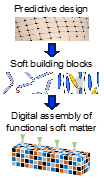IRG 1. Programmable Multiscale and Multi-Material Control of Functional Soft Matter
Lead: Katia Bertoldi
Co-Lead: Lakshminarayanan Mahadevan
Primary Faculty Participants: Joanna Aizenberg, David R. Clarke, Boris Kozinsky, Jennifer Lewis, Kevin Parker, Christopher T. Rycroft, Zhigang Suo, and Conor J. Walsh
Secondary Participants: Ronald Pindak (Brookhaven National Lab), Richard Vaia (Air Force Research Lab), and David A. Weitz (Harvard)


This IRG is aimed at fundamental advances in materials synthesis, modeling, and 3D printing that enable the creation of functional soft materials that augment human performance. New classes of soft materials that sense, actuate, and communicate are being developed for use in wearables, haptic interfaces, and artificial muscles connecting to NSF's 10 Big Ideas: Future of Work at the Human-Technology Frontier.
To carry out this research, we bring together a multidisciplinary research team composed of faculty members from applied mathematics, bioengineering, chemistry, materials, and mechanical engineering with deep expertise in theory and computation (Bertoldi, Kozinsky, Mahadevan, Rycroft, Suo), synthesis and assembly (Aizenberg, Clarke, Lewis, Parker, Vaia, Weitz), and characterization (Bertoldi, Clarke, Pindak, Suo, Walsh) to focus on three intertwined goals (Figure 1).
- Establish predictive design rules that guide the synthesis and digital assembly of soft functional materials across multiple scales.
- Synthesize soft building blocks composed of functional elastomers with controlled network architecture and stimuli-responsive moieties for creating soft functional materials.
- Create functional soft matter via digital assembly that sense, communicate, and actuate in response to external stimuli for potential application at the human-technology interface.
